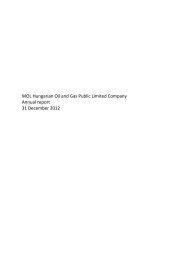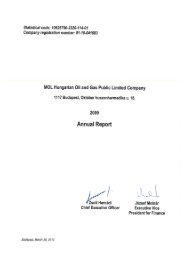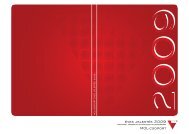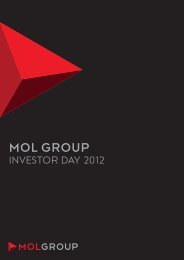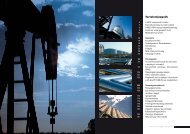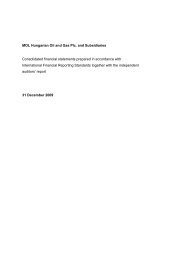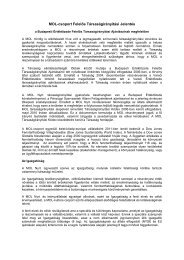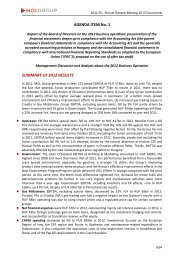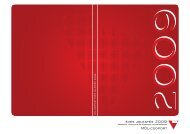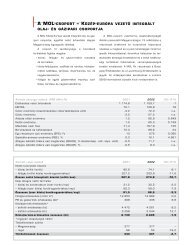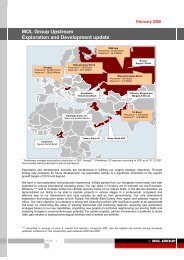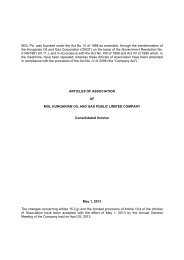MOL GROUP Annual Report
MOL GROUP Annual Report
MOL GROUP Annual Report
- No tags were found...
You also want an ePaper? Increase the reach of your titles
YUMPU automatically turns print PDFs into web optimized ePapers that Google loves.
Professional competency trainingsAdditional development programmes continued in 2010. For example, the Upstream Jolly Joker Programme successfullyimproved the maintenance skills of operators, supporting them in everyday maintenance-related tasks. The training not onlyincreases the value of human capital, but also helps to reduce maintenance costs.In the Downstream, <strong>MOL</strong> extended the Refinery Complex Programme. This special education project focuses primarily onblue collar workers in order to keep their knowledge regarding technological, maintenance and safety issues up-to-date.During the course of the project, a professional competency system was elaborated. The long-term goal is to define bothgeneral and professional competencies to be developed, and to match educational material to the scope of specific workcompetencies. The Refinery Complex Programme will cover all blue collar workers (shift leaders, controllers and systemoperators) in each and every facility. The programme is planned to be continued in 2011, but be enhanced to includethe revision of professional skill development for shift workers at Refineries in Hungary and Slovakia, and competencydevelopment for shift leaders.Also in 2009, as part of longer term capacity development, we launched a technical competency management pilotprogramme within the Upstream Division using PetroSkills, a leading oil industry alliance’s learning and developmentpackage. After a successful pilot project, we joined the alliance as a member company, and rolled out the system for theentire white collar Upstream staff of the mother company (and also covered around 25% of INA d.d. Upstream). For 2011,we plan to continue the roll-out for <strong>MOL</strong> Group’s Upstream companies and to launch a pilot programme in Refining. Ourapproach to competency management consists of an annual cycle of repeated (re)definition of competency requirements,on-line assessment to test the required competencies , and planning and delivery of learning and development interventionsto address identified gaps in competency. The results of the competency gap analysis are utilised as a basis of the Upstreamprofessional training planning process.From 2011, we will set up the Upstream Corporate University as a forum for internal Upstream professional skill andcompetency development.Commitment to Fair EmploymentAs Hungary has ratified the UN Universal Declaration of Human Rights, ILO Tripartite Declaration of Principles ConcerningMultinational Enterprises and Social Policy, and the OECD Guidelines for Multinational Enterprises, <strong>MOL</strong> Group considersthese agreements as compulsory codes.Equal opportunity and diversityWe ensure equal opportunities to all current and future employees. In fact, <strong>MOL</strong> goes beyond national regulations: equaltreatment for all is guaranteed through collective agreements, our Code of Ethics, Trade Union agreements, Group-wideguidelines and internal regulations.In June 2010, <strong>MOL</strong> managers and employee representative bodies signed the Equal Opportunity Plan (EOP) of <strong>MOL</strong> Plc valid for2010-2012. It is the first document in the Group that, besides declaring the necessity of equal opportunity and formulating a banon discrimination, specifies the responsible staff and establishes deadlines for actions. We are confident that the EOP will help toincrease the social awareness of our managers and members of certain employee groups which require more attention.The scope of this plan covers all the employees of <strong>MOL</strong> Plc., with special respect to women, single parents, parents with twoor more children under ten years of age, those with any kind of disability, and employees over 50 or belonging to a nationalor ethnic minority. Moreover, an Equal Opportunity Board has been established and an equal opportunity officer has beendesignated. In 2011, we would like to extend EOP to all Hungarian subsidiaries. A handbook with the necessary guidlines forimplementing EOP at subsidiaries have already been compiled.In 2010, <strong>MOL</strong> joined the Employers' Equal Opportunity Forum, the first professional lobby group bringing together equalopportunity mediators within companies, and providing them with a stronger platform to fight for equal opportunity.The Forum was initiated by the Salva Vita Foundation (Hungarian NGO), and it was founded with the participation of tenHungarian and multinational companies.Number and ratio of part time employees2007 2008 INA) INAChange2007-2010(%)GroupPart time employees (people) 92 125 114 143 +55% 191Ratio of part time employeesto the total workforce (%)0.60% 0.73% 0.64% 0.79% +32% 0.59%3.5 EthicsEthical frameworkIn 2010, we placed special emphasis on updating the Code of Ethics and Rules of Procedure, implementing e-learning andcontinuing ethical communication according to the following:– The Code of Ethics, adopted three years ago, was reviewed based on experiences gained after the Code hadbeen adopted. Other codes of ethics in this industry sector, provisions of law and suggestions and sustainabilityevaluation criteria were also used in the evaluation. The revised Code of Ethics emphasises that the normsformulated in the Code cover all stakeholders, and that the managers exercise special responsibility for integratingethical norms into everyday corporate practice. Regulations for accepting gifts and rules of ethical procedureswere also changed. The position of Ethics Officer was introduced for the companies of the <strong>MOL</strong> Group;– Ethics e-learning aimed at improving awareness was successfully completed by 99% of <strong>MOL</strong> Plc employees withIntranet access, by 97% of TVK Plc employees with Intranet access, and 100% of Slovnaft employees with Intranetaccess. In addition, live ethics training sessions were held in several companies of the <strong>MOL</strong> Group;– IES, the Italian member of the Group, has also adopted the Code of Ethics;– Within the framework of internal communication, three articles were published in the internal company magazine,Panoráma, which dealt with the ethics evaluation of 2009, the results of the e-learning courses, and the positionstaken by the Ethics Council on promoting awareness of acceptable behavior in particular situations;– Ethical expectations and Key Performance Indicitors (KPI) were defined for all Country Chairperson;– INA adopted the Code of Ethics in 2010, and the INA Ethics Council was established with an independent expertappointed as Council Chairman. In 2010, the INA Ethics Council received one notification, and its investigation is inprogress.Ethical casesOnly the ethics cases reported to the Ethics Council are summarised below. The task of the Council is to ensure that all <strong>MOL</strong>Group employees comply with the Code. Among the most important of the Council’s duties and responsibilities is replyingto complaints and questions, and conducting consequent investigations. At Slovnaft, questions related to ethical issuesare answered by the in-house Ethics Advisory Service in conjunction with the Ethics Council. In 2010, the Ethics Councilresponded to 89 questions related to harassment, discrimination, conflicts of interest and business gifts.In 2010, the Ethics Council received ten notifications. The Ethics Council investigated seven of the ten cases, and in four casesthe Corporate Security department was asked to conduct investigations. Ethical misconduct was proven in four cases out ofseven.The increasing number of notifications and questions means that employees now pay more attention to ethical issues anddisplay increasing trust in the Ethics Council.SustainabilityWork-life balanceAlthough there is not presently a Group level set of policies addressing work-life balance, <strong>MOL</strong> has taken initial steps towardsthe encouragement of non-typical employment. Part-time work and telecommuting are not an option for those involved inproduction activities because of the type of work (shift-working); however, they are accessible for other employees in certainpositions. Although only 12 employees at <strong>MOL</strong> Plc. were telecommuting in 2010, the rate of those who have gained approvalto work from home, after managerial approval, is much higher in certain cases.In the future, we intend to disseminate the currently ad hoc best practices, and establish value-based standards. As the firststep, these principles were integrated into the Group level agreement on social issues signed with trade unions in 2010.194 <strong>MOL</strong> Group annual report 2010 195



